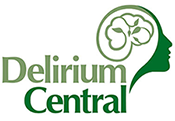Delirium Clinical Practice Guidelines
Delirium Clinical Practice Guidelines
- American Geriatrics Society Clinical Practice Guideline for Postoperative Delirium in Older Adults (2014): The overall goal of this clinical guideline is to improve clinical care of adults 65 years and older through prevention and treatment of delirium in the postoperative setting. The recommendations are made based on studies that included both surgical and nonsurgical patient cohorts. The specific aims addressed by the guideline include (1) the nonpharmacologic and pharmacologic interventions that should be implemented perioperatively for the prevention (ie, before delirium occurs) of postoperative delirium, and (2) the nonpharmacologic and pharmacologic interventions that should be implemented perioperatively for treatment (ie, once delirium has occurred) of postoperative delirium.
- ADEPT: Confusion and Agitation in the Elderly ED Patient Guidelines from the America College of Emergency Physicians: In 2018, the American College of Emergency Physicians (ACEP) released a tool designed by experts in the field of geriatric emergency medicine to address delirium in the emergency department patient. Assess, Diagnose, Evaluate, Prevent, and Treat (ADEPT) provides evidence-based best practices for delirium, from performing a thorough physical exam to verbal de-escalation principles to pharmacological considerations. You can access the ADEPT tool here.
- Clinical Practice Guidelines for the Prevention and Management of Pain, Agitation/Sedation, Delirium, Immobility, and Sleep Disruption in Adult Patients in the ICU: Published in 2018, in Critical Care Medicine, these Clinical Practice Guidelines provide updates and expansion to the 2013 originally published guidelines of the same name. Content experts, methodologists, and ICU Survivors were among the interdisciplinary cohort of international experts highlighting evidence-supported recommendations, as well as remaining literature gaps and research needs. These guidelines are endorsed by several critical care and delirium-specific professional associations and organizations.
- Delirium Toolkit, Regional Geriatric Program of Toronto (2018): The Regional Geriatric Program (RGP) is a network of specialized geriatric services that “provides a range of hospital and community-based health care services for elders”. This toolkit, part of their Senior Friendly Care (sfCare) series, acts as a guidance document, providing delirium-specific resources for clinical best practices, as well as self-management tools.
- Geriatric Emergency Department Guidelines: Geriatric Emergency Department Guidelines are a top-year, consensus-based collaboration between the American College of Emergency Physicians, American Geriatrics Society, Emergency Nurses Association, and Society for Academic Emergency Medicine. Approved for publication in 2013-2014, these guidelines propose a standardized set of guidelines to effectively improve care of older adults in the emergency department. You can find delirium-specific guidelines beginning on page 28 of this PDF.
- NICE Guidelines for Delirium: Clinical Guidelines for Delirium published by the NHS National Institute for Health and Clinical Excellence. The recommendations in the NICE guideline cover the care of adults (18 and over) with, or at risk of, delirium in hospital and in long-term residential care or a nursing home. The guidelines describe methods of preventing, identifying, diagnosing and managing delirium (Published: 28 July 2010; Last updated: 14 March 2019).
- Optimal Perioperative Management of the Geriatric Patient: Best Practice Guidelines from ACS NSQIP/American Geriatrics Society (2016): Best practice guidelines to prevent and treat postoperative delirium in older patients, developed in collaboration by the American College of Surgeons and American Geriatrics Society.
- Registered Nurse’s Association: Screening for delirium, dementia, and depression in older adults: This is a 2016 document from the Registered Nurses Association of Ontario, which includes nursing best practice guideline for screening of delirium, depression and dementia in older adults.






